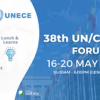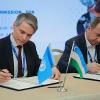News
Displaying Results 76 - 100 of 127
Recent disruptions of supply chains have exposed fragilities in the current trading system and brought to light the importance of resilience and transparency in global trade.
UNECE and other international organizations play a crucial role in supporting countries (including both the public and…
As an established convenor of standards developing organisations, UNECE encourages the integration of a gender perspective, providing practical steps for organisations to advance women’s full and effective participation in standards and standards development. With the objective of strengthening…
The textile industry is a key driver of Uzbekistan’s economy, reflected in the country’s rank as sixth largest cotton producer in the world. In 2021, the country accelerated the battle against its child and forced labor violations in cotton harvest according to a new International Labour…
As supply chains within the garment and footwear sector are becoming increasingly complex, the need for transparency is more relevant than ever. Consumers, investors and shareholders are pressing for transparent business activities as well as the prevention and mitigation of risks in value chains,…
With the review of the amended Protocol to Abate Acidification, Eutrophication and Ground-Level Ozone (Gothenburg Protocol) under the UNECE Convention on Long-range Transboundary Air Pollution well underway, experts further discussed the sufficiency and effectiveness of current measures at the 60th…
Global trade has been transformed repeatedly throughout history, driven by new business processes and new policies. The new advances in digitalization now promise further transformation by making it faster, more transparent, reducing risks of red tape and corruption. With the increase in global…
Over 60 participants worldwide joined the online roundtable organized by the UN Digital transformation group for Europe and Central Asia (DTG4ECA) in the framework of the Regional Forum on Sustainable Development for the UNECE region. Established in May 2020, DTG4ECA group, co-chaired by UNECE and…
Strengthening value chains between Africa and the European Union (EU) is a priority objective for sustainable growth and decent jobs across the two continents. Recent market imbalances and disparities, involving supply chain disruptions and lack of attention to the social and environmental impacts…
Today marks the holding of the first meeting of the Working Group on Tailings Safety and the Prevention of Accidental Water Pollution (IIWG) in Kazakhstan – the first comprehensive dialogue on these issues between all relevant stakeholders and national authorities in the country.
After being…
“Countries need to take concrete actions to prevent, prepare for and respond to industrial accidents and reduce the risks of related technological disasters. The UNECE Convention on the Transboundary Effects of Industrial Accidents and the tools developed for its implementation provide a means to…
The global economy enters 2022 with new challenges. Almost two years into the Covid-19 pandemic the digitalization of transport and trade data flows is on top of the economic agenda. In response, UNECE organized its 4th workshop on trade facilitation, Single Window, and data sharing for the Western…
Trade facilitation is a key priority for Kyrgyzstan and its trading community for participation in the global and regional trading system. Under the project on “Strengthening the capacity of the Kyrgyzstan National Trade Facilitation Council to implement the WTO Trade Facilitation Agreement”, UNECE…
Complex global value chains include production facilities scattered all over the world. Sometimes, they may also involve practices of illegitimate subcontracting and undeclared informal work. In fact, their complexity and opacity make it very hard to gain accurate information about how and where…
From the Sandoz chemical spill of 1986 in Schweizerhalle, Switzerland, to the rupture of a dam storing mine tailings containing cyanide in Baia Mare, Romania, 2000; and last year in Beirut, the explosion of ammonium nitrate stored in warehouse near residential areas, what these chemical and…
COP26 was a positive step forward in the fight against climate change, but as the UN Secretary General pointed out in his comments: “it is not enough. We must accelerate climate action to keep alive the goal of limiting the global temperature rise to 1.5 degrees.” The compromise deal reflects the…
The COVID-19 pandemic has brought about immense changes in how people move around the world. International travel ground almost to a halt at the onset of the crisis, as restrictions were imposed and borders closed. Internal migration, too, was restricted in many countries as lockdowns were declared…
As all eyes turn to Glasgow where world leaders have gathered at COP26 for crucial negotiations to cut greenhouse gas (GHG) emissions and limit global warming, UNECE experts highlight how improved transparency and traceability could be part of the solution. The private sector has a vital role to…
The Group of 7 nations (G7), six of which are UNECE member States (Canada, France, Germany, Italy, the UK and the US), took bold step towards reducing barriers to trade by agreeing on the principles to govern cross-border data use and digital trade. At their meeting in London on 22 October,…
A map of air pollutant emission sources of a given country can help experts and decision-makers understand which policies are most viable. Spatial allocations of emissions are also important to understand where emissions are coming from on a regional level.
Spatially allocating – or gridding –…
This year, the UNECE region has seen devastating impacts of climate change and multiple natural disasters, such as the floods in Belgium, the Netherlands and Germany. Disasters caused by natural hazards, on the rise due to climate change, can also trigger technological accidents.
On today’s…
The COVID-19 pandemic restrictions have brought the benefits of paperless trading to the forefront of attention. Many countries are considering issuing, accepting and exchanging electronic documents for paperless trading. Issues related to paperless trading are also at the core of World Trade…
With the review of the amended Protocol to Abate Acidification, Eutrophication and Ground-Level Ozone (Gothenburg Protocol) well underway, expert groups under the UNECE Air Convention are now collecting information to assess the effectiveness of measures.
The amended Protocol establishes legally…
The need to digitalize information flows in international supply chains became clearer than ever during the pandemic, thanks to the reduced person-to-person contact this allows, on top of important efficiency gains. However, efforts to date have been fragmented. UNECE and its subsidiary body UN/…
With the UN Food Systems Summit taking place next week under the auspices of the UN General Assembly (23 September 2021), we must recognize that the food systems we have built over recent decades are unsustainable. The food choices we make every day as consumers and producers of food are having a…
A coordinated response is necessary for promoting and implementing the circular economy agenda globally. Concrete commitments from governments, businesses, international organizations, civil society and other stakeholders will be key to building the sustainable, resilient and low-carbon economy…


























